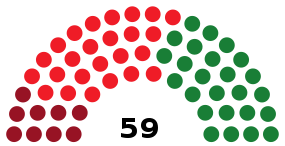1979 Madrid City Council election
The 1979 Madrid City Council election, also the 1979 Madrid municipal election, was held on Tuesday, 3 April 1979, to elect the 1st City Council of the municipality of Madrid. All 59 seats in the City Council were up for election. The election was held simultaneously with local elections all throughout Spain.
| [[File:|50px|border |alt=|link=]] | |||||||||||||||||||||||||||||
| |||||||||||||||||||||||||||||
All 59 seats in the City Council of Madrid 30 seats needed for a majority | |||||||||||||||||||||||||||||
|---|---|---|---|---|---|---|---|---|---|---|---|---|---|---|---|---|---|---|---|---|---|---|---|---|---|---|---|---|---|
| Registered | 2,378,941 | ||||||||||||||||||||||||||||
| Turnout | 1,569,610 (66.0%) | ||||||||||||||||||||||||||||
| |||||||||||||||||||||||||||||
| |||||||||||||||||||||||||||||
The Union of the Democratic Centre (UCD) emerged as the most voted party, but in a seat tie with the second force, the Spanish Socialist Workers' Party (PSOE), at 25 seats. As neither had an absolute majority of seats, it was up to the Communist Party of Spain (PCE) 9 seats to decide which party was to govern in Madrid.
Finally, an agreement between the PSOE and PCE resulted in Enrique Tierno Galván being named as the first democratically elected Mayor of Madrid.
Electoral system
The City Council of Madrid (Spanish: Ayuntamiento de Madrid) was the top-tier administrative and governing body of the municipality of Madrid, composed of the mayor, the government council and the elected plenary assembly.[1][2]
Voting for the local assembly was on the basis of universal suffrage, which comprised all nationals over eighteen, registered in the municipality of Madrid and in full enjoyment of their civil and political rights. Local councillors were elected using the D'Hondt method and a closed list proportional representation, with a threshold of five percent of valid votes—which included blank ballots—being applied in each local council. Parties not reaching the threshold were not taken into consideration for seat distribution.[1][2] Councillors were allocated to municipal councils based on the following scale:
| Population | Councillors |
|---|---|
| <250 | 5 |
| 251–1,000 | 7 |
| 1,001–2,000 | 9 |
| 2,001–5,000 | 11 |
| 5,001–10,000 | 13 |
| 10,001–20,000 | 17 |
| 20,001–50,000 | 21 |
| 50,001–100,000 | 25 |
| >100,001 | +1 per each 100,000 inhabitants or fraction +1 if total is an even number |
The mayor was indirectly elected by the plenary assembly. A legal clause required that mayoral candidates earned the vote of an absolute majority of councillors, or else the candidate of the most-voted party in the assembly was to be automatically appointed to the post. In the event of a tie, the eldest one would be elected.[1]
The electoral law allowed for parties and federations registered in the interior ministry, coalitions and groupings of electors to present lists of candidates. Parties and federations intending to form a coalition ahead of an election were required to inform the relevant Electoral Commission within fifteen days of the election call, whereas groupings of electors needed to secure the signature of at least one-thousandth of the electorate in the constituencies for which they sought election—with a compulsory minimum of 500 signatures—disallowing electors from signing for more than one list of candidates.[2]
Results
 | ||||||
| Parties and coalitions | Popular vote | Seats | ||||
|---|---|---|---|---|---|---|
| Votes | % | ±pp | Total | +/− | ||
| Union of the Democratic Centre (UCD) | 632,329 | 40.29 | n/a | 25 | n/a | |
| Spanish Socialist Workers' Party (PSOE) | 619,772 | 39.49 | n/a | 25 | n/a | |
| Communist Party of Spain (PCE) | 230,651 | 14.69 | n/a | 9 | n/a | |
| Workers' Revolutionary Organization (ORT) | 37,396 | 2.38 | n/a | 0 | n/a | |
| Spanish Phalanx of the CNSO (FE–JONS) | 25,038 | 1.60 | n/a | 0 | n/a | |
| Spanish Socialist Workers' Party (historical) (PSOEh) | 5,317 | 0.34 | n/a | 0 | n/a | |
| Communist Unification of Spain (UCE) | 5,251 | 0.33 | n/a | 0 | n/a | |
| Spanish Communist Workers' Party (PCOE) | 5,241 | 0.33 | n/a | 0 | n/a | |
| Communist Movement–Organization of Communist Left (MC–OIC) | 2,401 | 0.15 | n/a | 0 | n/a | |
| Socialist Party (PS) | 2,298 | 0.15 | n/a | 0 | n/a | |
| Liberal Party (PL) | 2,132 | 0.14 | n/a | 0 | n/a | |
| Revolutionary Communist League (LCR) | 1,784 | 0.11 | n/a | 0 | n/a | |
| Blank ballots | 0 | 0.00 | n/a | |||
| Total | 1,569,610 | 59 | n/a | |||
| Valid votes | 1,569,610 | 100.00 | n/a | |||
| Invalid votes | 0 | 0.00 | n/a | |||
| Votes cast / turnout | 1,569,610 | 65.98 | n/a | |||
| Abstentions | 809,331 | 34.02 | n/a | |||
| Registered voters | 2,378,941 | |||||
| Sources[3][4] | ||||||
References
- "Ley 39/1978, de 17 de julio, de elecciones locales". Law No. 39 of 17 July 1978. Boletín Oficial del Estado (in Spanish). Retrieved 1 July 2020.
- "Real Decreto-ley 20/1977, de 18 de marzo, sobre Normas Electorales". Royal Decree-Law No. 20 of 18 March 1977. Boletín Oficial del Estado (in Spanish). Retrieved 1 July 2020.
- "Electoral Results Consultation. Municipal. April 1979. Madrid Municipality". www.infoelectoral.mir.es (in Spanish). Ministry of the Interior. Retrieved 12 November 2017.
- "Municipal elections in Madrid since 1979". historiaelectoral.com (in Spanish). Electoral History. Retrieved 30 September 2017.
_Adolfo_Su%C3%A1rez_junto_al_ministro_de_Transportes_y_Comunicaciones_(cropped)_(cropped).jpeg)
.jpg)
.jpg)